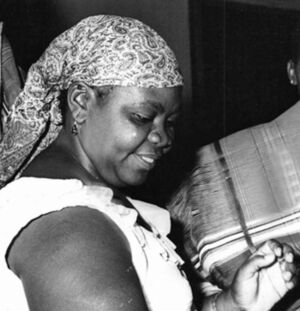Bibi Titi Mohammed facts for kids
Quick facts for kids
Bibi Titi Mohammed
|
|
|---|---|

Bibi Titi Mohammed
|
|
| Born | June 1926 Dar es Salaam, Tanzania
|
| Died | 5 November 2000 (aged 74) Johannesburg, South Africa
|
| Occupation | Politician |
Bibi Titi Mohammed (born June 1926 – died 5 November 2000) was an important Tanzanian politician and activist. She was born in Dar es Salaam, which was then the capital of Tanganyika. She was seen as a brave freedom fighter who strongly supported Julius Nyerere, who became Tanzania's first president. Bibi Titi Mohammed was a key member of the Tanganyika African National Union (TANU) party. This party worked hard to gain independence for Tanzania. She also held different jobs in the government. Later, she faced serious accusations and was imprisoned, but she was later released by a special pardon from the president.
Contents
A Champion for Tanzania
Her Early Life
Bibi Titi grew up in the Matumbi tribe. Her father did not want her to go to school because he worried she might lose her Muslim faith. But after her father passed away, her mother decided to send her to school. Her mother understood how important education was for young women. This early influence from her mother helped Bibi Titi become a strong voice for women's rights and for her country's independence.
Family Life
When she was fourteen, Bibi Titi got married. She later had a daughter named Halima. Bibi Titi believed strongly in education. Because of this, she made sure her daughter finished school before getting married.
Starting Her Political Journey
Bibi Titi Mohammed began her public life as a lead singer in a ngoma group. A ngoma is a traditional dance and music group. She would sing during celebrations for the prophet Mohammed.
After World War II in the 1950s, she became involved in the movement to free Tanzania from colonial rule. On July 7, 1954, Julius Nyerere created the Tanganyika African National Union (TANU) party. Bibi Titi met Nyerere in 1954 and they became close friends.
Leading Women to Independence
In 1955, Bibi Titi became the leader of the 'Umoja wa Wanawake wa Tanzania' (UWT). This was the women's group of the TANU party. In just three months, she helped more than 5,000 women join TANU. She played a huge part in the fight for independence against the British. Bibi Titi helped share the UWT's ideas with many people. She also brought women together to fight against colonial rule, giving them a powerful, united voice.
Tanzania became an independent country in 1961. Bibi Titi's leadership also helped in writing the country's constitution in 1964. She became a junior minister for women and social affairs. This helped women gain important positions in the Tanzanian government. She also helped create the All African Women Conference.
Standing Up for What She Believed In
In 1965, Bibi Titi lost her seat in parliament, which meant she lost some of her power. By 1967, she left her position in the party's main committee. She did this to show her disagreement with a rule in the Arusha Declaration. This was Nyerere's plan for African socialism. The rule said that members of the central committee could not rent out properties. For many women, renting properties was one of the few ways they could earn a steady income because they often lacked formal education. Bibi Titi stood up for these women.
Her Role in TANU
Bibi Titi Mohammed was very important in creating TANU. This party became the main political party in Tanzania. Her involvement grew after she met Julius Nyerere. Nyerere believed in equality for men and women. This belief helped women like Bibi Titi and Sofia Kawawa take on leadership roles in TANU. Giving women a public voice was a big goal for Nyerere. This gave Bibi Titi the chance she needed to make a difference. As the leader of the UWT, the women's wing of TANU, she helped spread TANU's ideas and unite women across Tanzania.
A Difficult Time
In October 1969, Bibi Titi was arrested along with others. She was accused of being involved in a serious plot against the government. She was put on trial. After a long trial, she was sentenced to prison. While she was in prison, many of her political friends and associates distanced themselves from her. After two years, President Nyerere changed her sentence, and she was released from prison.
Later Life and Recognition
After being released from prison, Bibi Titi stayed out of public life. She lived the rest of her life in Johannesburg, South Africa. In 1991, when Tanzania celebrated 30 years of independence, a newspaper of the ruling party called Bibi Titi "A Heroine of Uhuru (Freedom) Struggle." This showed that her important work was still remembered. She passed away on November 5, 2000, in a hospital in Johannesburg.
Her Lasting Impact
Bibi Titi Mohammed's legacy continues to be important in Tanzania. She played a huge role in improving education and fighting for women's equality. She bravely stood up for what she believed in, even when it caused her trouble. Today, one of Dar es Salaam's main roads is named after her. This honors her great achievements in helping Tanzania gain its independence.
In 2020, a project called 'African Roots' by Deutsche Welle created an animated story and video about her life for young people in Africa.
 | Claudette Colvin |
 | Myrlie Evers-Williams |
 | Alberta Odell Jones |

